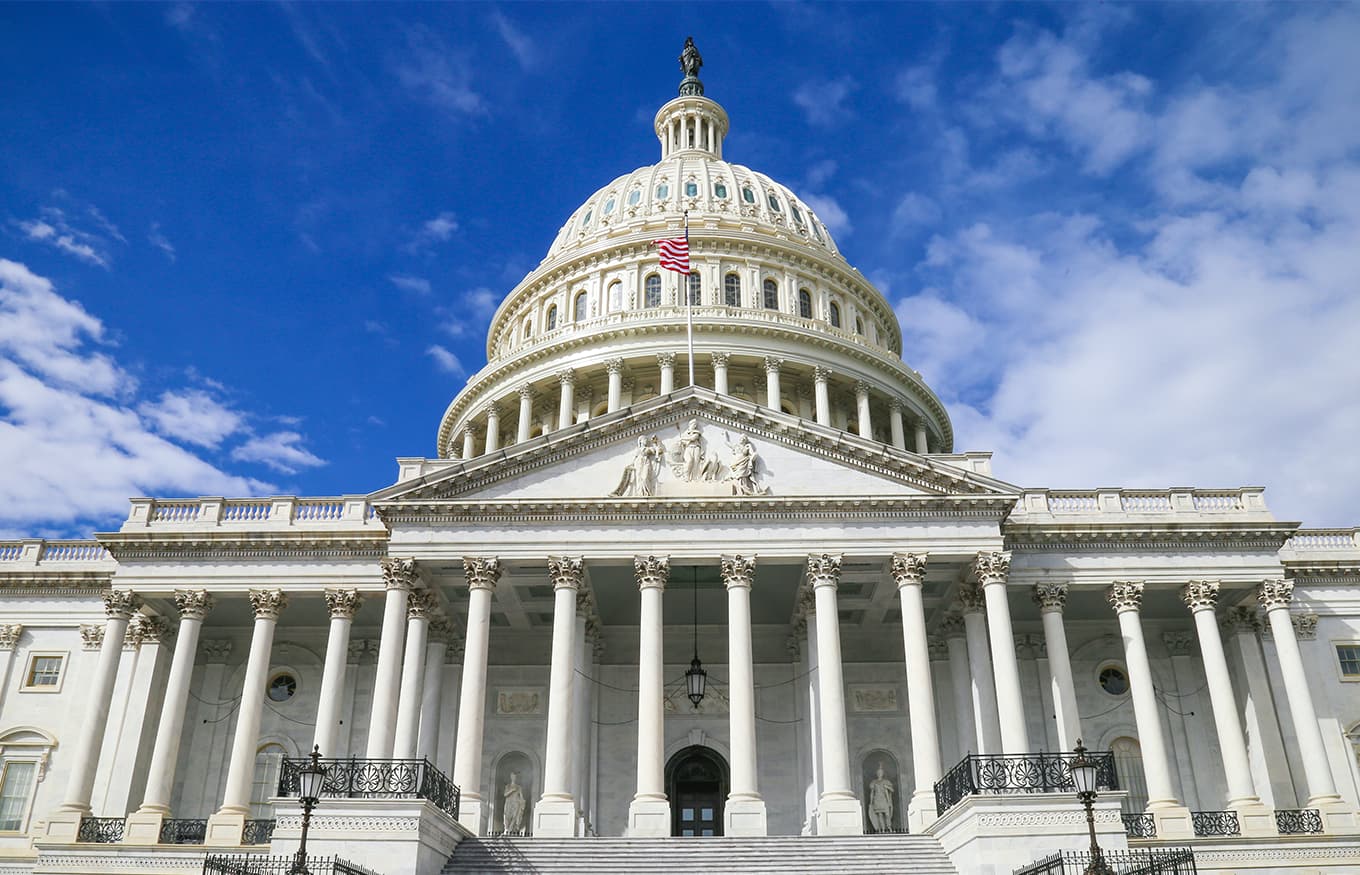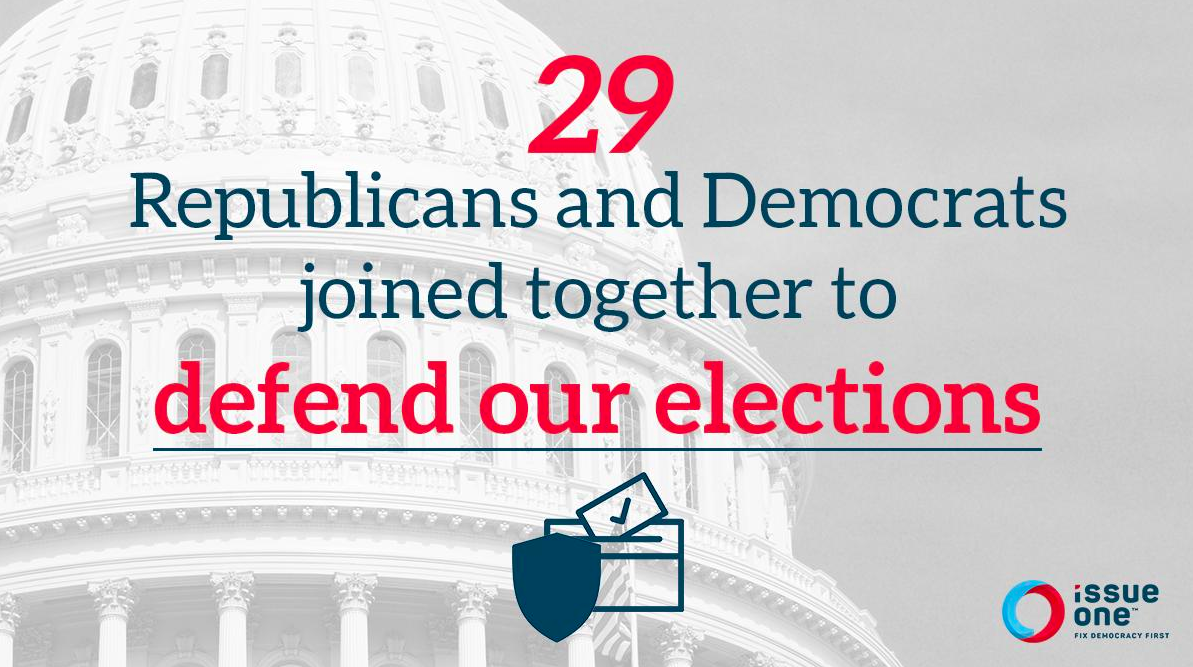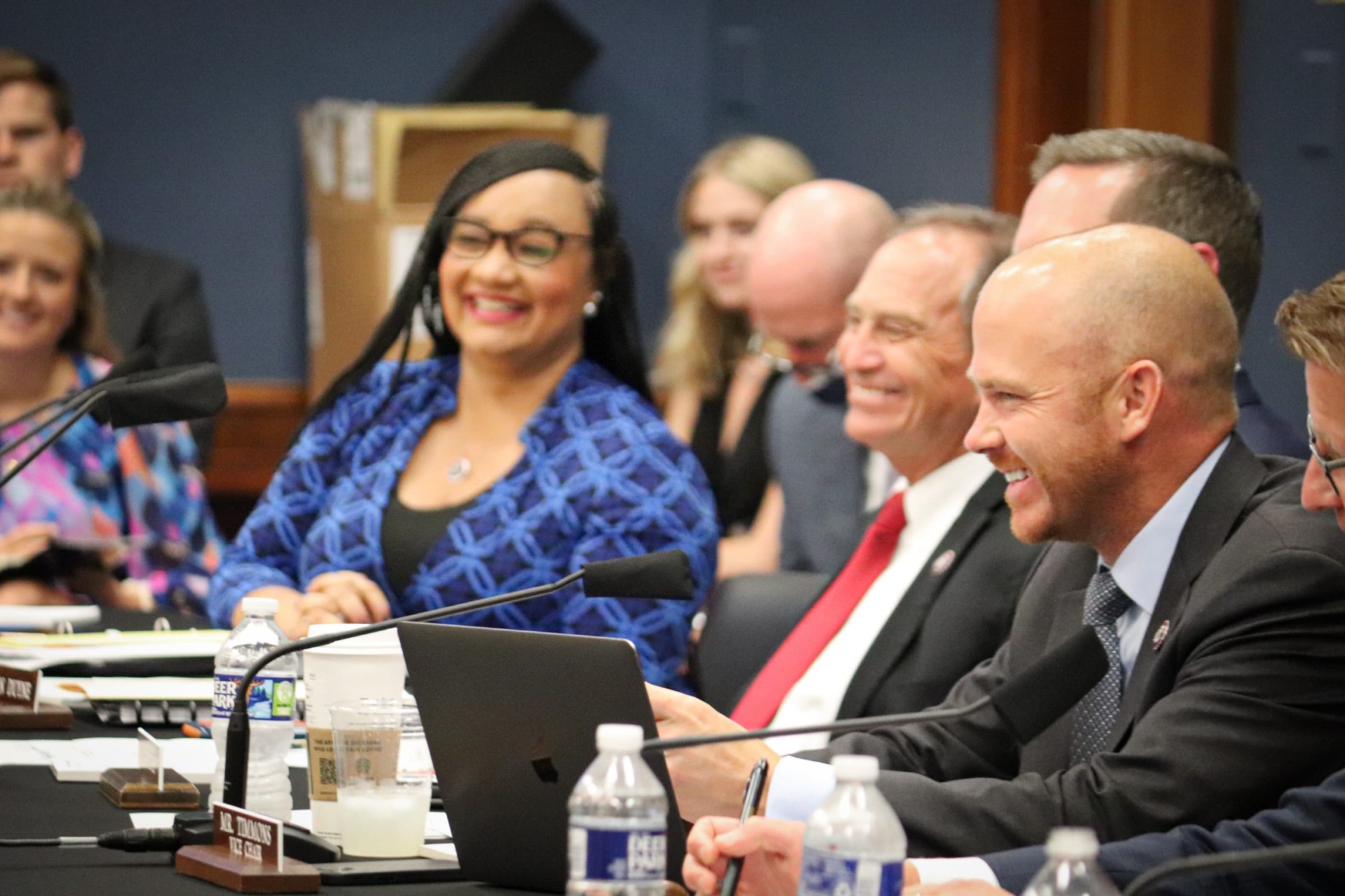Today, Senators Amy Klobuchar (D-MN), Lindsey Graham (R-SC), and Mark Warner (D-VA) introduced the Honest Ads Act (S. 1356) to combat foreign interference in U.S. elections. The bill is the best first step to stopping hidden, foreign disinformation campaigns in our elections.
A bipartisan companion measure was also introduced in the House by Reps. Derek Kilmer (D-WA), Elise Stefanik (R-NY), and 24 other original sponsors. (As of June 10, there are 33 sponsors of the Honest Ads Act. The full list of sponsors is below)
“Now is the time for Congress to unite behind this bipartisan bill to fix our political system by helping to prevent foreign actors like Russia from interfering in our elections. Our democracy must be protected from authoritarian regimes trying to undermine us. Senators Klobuchar, Graham, and Warner deserve enormous credit for continuing to make election security a top priority and other senators need to join them in their cause,” said Issue One CEO Nick Penniman.
Added Issue One Executive Director Meredith McGehee: “Americans have been waiting for Congress to protect our elections from foreign interference for more than two years. These lawmakers should be applauded for coming together in a bipartisan fashion to provide Americans with the tools they need to know who is trying to influence their vote in 2020 and beyond.”
There is mounting evidence that this bill is needed now more than ever: U.S. national security officials are preparing for Russian interference in the 2020 presidential elections and other foreign meddling for decades to come.
Issue One’s ReFormers Caucus delivered a letter today to Capitol Hill encouraging leaders to pass the Honest Ads Act to protect our elections from foreign actors seeking to do us harm. It was signed by 116 former members of Congress, governors, and Cabinet officials — 50 Republicans, 65 Democrats — including:
Homeland Security Secretary & Rep. Tom Ridge (R-PA), Defense Secretary & Sen. Chuck Hagel (R-NE), Acting Army Secretary & Rep. Patrick Murphy (D-PA), and 9/11 Commission members Gov. Tom Kean (R-NJ), Sen. Bob Kerrey (D-NE), and Amb. Tim Roemer (D-IN). Also, Senate Majority Leader Tom Daschle (D-SD), Transportation Secretary & Rep. Ray LaHood (R-IL), Agriculture Secretary & Sen. Dan Glickman (D-KS), Agriculture Secretary & Gov. Ed Schafer (R-ND), Labor Secretary & Rep. Bill Brock (R-TN), Ambassador to OECD & Rep. Connie Morella (R-MD), Ambassador to Denmark & Rep. Dick Swett (D-NH), Ambassador to Saudi Arabia & Sen. Wyche Fowler (D-GA).
The letter states, “Our commitment to defending the national security of the United States crosses partisan and ideological divides. Many of us served in a branch of the armed forces, oversaw national security while serving in Congress, or directed an agency charged with preventing domestic and foreign attacks against the United States. We hope that you take this important moment to reach across party lines to pass the Honest Ads Act and other critical foreign interference and cybersecurity measures that will protect and secure our elections.” The ReFormers Caucus is the largest bipartisan coalition of former members of Congress, governors, and Cabinet officials ever assembled to advocate for solutions to fix our broken political system.
The full list of Honest Ads Act sponsors in the House and Senate as of June 10 includes:
| Republicans |
Democrats |
| Senator Lindsey Graham (R-SC) |
Senator Amy Klobuchar (D-MN) |
| |
Senator Mark Warner (D-VA) |
| Representative Elise Stefanik (R-NY) |
Representative Derek Kilmer (D-WA) |
| Representative Brian Fitzpatrick (R-PA) |
Representative John Sarbanes (D-MD) |
| Representative Mike Gallagher (R-WI) |
Representative Kathleen Rice (D-NY) |
| Representative John Katko (R-NY) |
Representative Charlie Crist (D-FL) |
| Representative Jaime Herrera Beutler (R-WA) |
Representative Thomas Suozzi (D-NY) |
| Representative Sean Duffy (R-WI) |
Representative Jimmy Panetta (D-CA) |
| Representative Mario Diaz-Balart (R-FL) |
Representative Bradley Schneider (D-IL) |
| Representative David B. McKinley (R-WV) |
Representative Jim Costa (D-CA) |
| Representative Jeff Fortenberry (R-NE) |
Representative Dean Phillips (D-MN) |
| Representative Jenniffer González-Colón (R-PR) |
Representative Scott Peters (D-CA) |
| Representative Don Bacon (R-NE) |
Representative Adam Smith (D-WA) |
| Representative Pete Stauber (R-MN) |
Representative Kurt Schrader (D-OR) |
| Representative Anthony Gonzalez (R-OH) |
Representative Ben Ray Lujan (D-NM) |
| Representative Peter King (R-NY) |
Representative Elijah Cummings (D-MD) |
| Representative Pete Olson (R-TX) |
Representative Jim Cooper (D-TN) |
Meanwhile, major technology companies continue to support the Honest Ads Act and encourage Congress to take action against foreign interference. Facebook, Google, IBM, Microsoft, and Twitter — whose platforms have constantly been abused by actors wishing to do the U.S. harm — all support the Honest Ads Act. Facebook CEO Mark Zuckerberg said, “Election interference is bigger than any one platform, and that’s why we support the Honest Ads Act.” IBM called for updates to political advertising laws, noting that “responsibility is the key to preserving society’s trust in technology.”
The Honest Ads Act would implement a disclosure system for paid, online political advertising modeled off existing rules covering paid political ads on television and radio.
What Honest Ads Does:
- Helps safeguard U.S. politics from foreign interference: It provides an important tool to discover and monitor disinformation campaigns
- Subjects online paid political ads to rules modeled on those already in place for TV and radio ads: The act would establish a commonsense disclosure system closely modeled on longstanding Federal Communications Commission (FCC) rules for paid political advertising on television and radio.
- Allows voters to transparently know who is trying to influence their decisions: The largest online platforms — such as a social network, ad network or search engine like Facebook, Google or Twitter — would be required to obtain and publicly disclose information from the purchasers of paid, online political advertising, including the name of the person or group who bought that advertisement, the rate charged, a description of the targeted audience and the date and time the advertisement was first displayed.
What Honest Ads Does Not Do:
- Restrict political advertising on the internet: Under the bill, any U.S. citizen would still be able to purchase an online political ad. It also does not impose any additional restrictions on advertising. The prohibition on foreign spending already exists in law, the Honest Ads Act simply provides an important tool to enforce that prohibition.
- Chill First Amendment rights: The Honest Ads Act is a transparency measure and it only covers largest online advertising platforms, like Facebook and Google, and only kicks in when an individual or group spends $500 or more.
- Target specific ideologies or burden any one side: The Act is viewpoint neutral and is modeled on disclosure standards that have been used in television and radio advertising for decades.
To learn more about the Honest Ads Act, click here.






